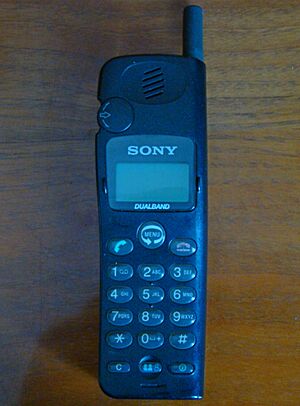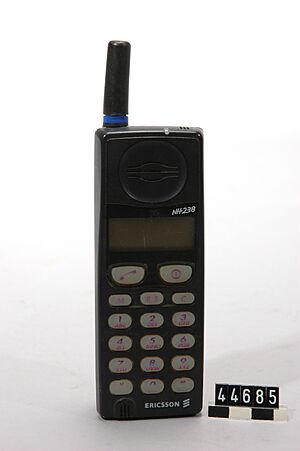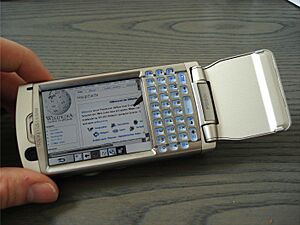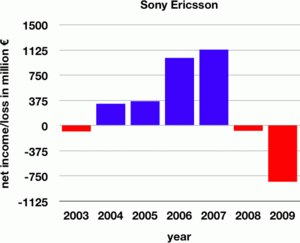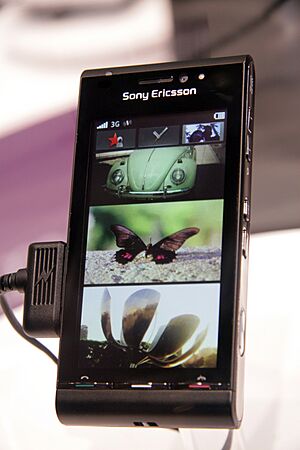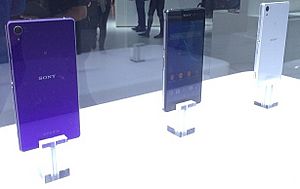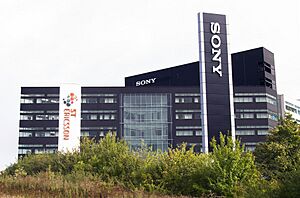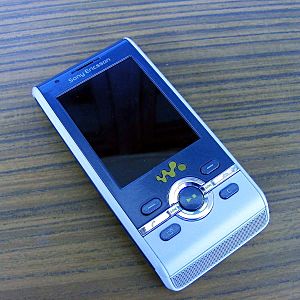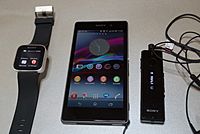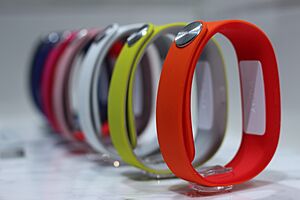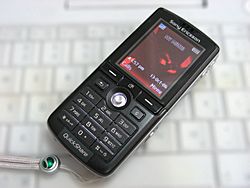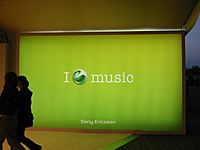Sony Mobile facts for kids
 |
|
|
Native name
|
ソニーモバイルコミュニケーションズ株式会社
|
|---|---|
|
Formerly
|
Sony Ericsson (2001–2012) |
| Subsidiary | |
| Industry | Telecommunications |
| Fate | Merged with Sony Corporation |
| Predecessor | Ericsson Mobile Communications |
| Founded | October 1, 2001 |
| Defunct | April 1, 2021 |
| Headquarters |
,
Japan
|
|
Key people
|
Kenichiro Yoshida Mitsuya Kishida Kimio Maki |
| Owner | Sony Corporation |
Sony Mobile Communications Inc. was a big company that made phones and other communication devices. It started on October 1, 2001. It was a joint venture between two large companies: Sony Corporation and Ericsson.
The company was first called Sony Ericsson Mobile Communications. Its main office was in London, England. Later, in 2012, Sony bought Ericsson's part of the company. On April 1, 2021, Sony Mobile became part of a bigger company called Sony Corporation.
Before 2021, Sony Mobile mainly made Android smartphones. These phones were known as the Xperia series. They also made tablet computers, smartwatches, and fitness trackers.
Sony Mobile had special places where they designed and tested new products. These places were in Lund, Sweden; Beijing, China; Tokyo, Japan; and San Francisco, United States. In 2007, Sony Ericsson was very popular. It made about 9% of all mobile phones in the world. This made it the fourth largest phone maker back then.
Contents
History of Sony Mobile
How Sony Mobile Started
The Swedish company Ericsson started making mobile phones in the 1980s. Their first small, portable phone was called the Hotline Pocket in 1987. In the early 1990s, Ericsson worked with General Electric in the United States. This helped them become better known there.
Ericsson used to get computer chips for its phones from one factory in New Mexico. In March 2000, there was a fire at this factory. This fire caused big problems for Ericsson. They had a serious shortage of parts. This meant they couldn't make enough phones.
At that time, Ericsson was the third largest phone maker in the world. But they were losing money and customers. This was partly because of the fire. Also, they found it hard to make cheaper phones or phones with cool designs like Nokia. People wondered if Ericsson would sell its phone business. But the company's president said they would not.
Sony was a small player in the phone market in 2000. They had less than 1% of the market. By August 2001, Sony and Ericsson decided to join forces. Ericsson brought most of its mobile phone business. Sony brought its entire phone division. The new company started with 3,500 employees.
From 2001 to 2010
Sony Ericsson wanted to make phones that could take pictures and play videos. They released new models with built-in digital cameras and color screens. These were new and exciting features back then. Examples include the Sony Ericsson T610 and the Sony Ericsson K700.
Even with more sales, Sony Ericsson kept losing money at first. But their plan worked, and they made their first profit in 2003. In the years that followed, they sold more and more phones. The joint company was seen as a big success.
In 2005, Sony Ericsson launched the K750i. It had a 2-megapixel camera. They also released the W800i, which was the first Walkman phone. It could play music for 30 hours. Later that year, they showed the P990, a new type of smartphone.
Also in 2005, Sony Ericsson became a main sponsor for the WTA Tour. The women's professional tennis tour was renamed the Sony Ericsson WTA Tour.
In 2007, the company launched its first 5-megapixel camera phone, the Sony Ericsson K850i. In 2008, they released the C905, the world's first 8.1-megapixel camera phone. At a big tech show in 2009, Sony Ericsson showed off the first 12-megapixel camera phone, called Satio.
By 2009, Sony Ericsson announced that some of its phones would be made in India. They planned to make ten million phones a year there. India was a fast-growing market for mobile phones.
Sony Ericsson's phone sales dropped a lot from 1999 to 2003. The company lost money in many quarters. Their cash also went down a lot. The rise of Apple's iPhone and Google's Android phones hurt Sony Ericsson.
In 2008, another company, LG Electronics, sold more phones than Sony Ericsson. Sony Ericsson's profits fell a lot. They also announced they would cut 2,000 jobs. This made many people worry about the company's future.
By the end of 2009, Sony Ericsson had cut about 5,000 jobs. They also closed some of their design and research centers around the world.
From 2011 to 2020
On October 27, 2011, Sony announced it would buy Ericsson's share of Sony Ericsson. This made the mobile phone business fully owned by Sony. The deal was completed in February 2012. At a big electronics show, Sony announced that Sony Ericsson would simply be called Sony Mobile Communications.
On January 7, 2013, Sony Mobile moved its main office from Sweden to Tokyo, Japan. This helped it become fully part of Sony. The first phone released only under the Sony brand was the Sony Xperia S in 2012. Sony Mobile decided to stop making basic phones by September 2012. They wanted to focus only on smartphones.
In late 2012, Sony Mobile was the fourth largest smartphone maker. They shipped 9.8 million phones.
In 2012, Sony also bought a company called Gaikai. This was a cloud service that helped Sony expand into cloud gaming. Sony paid $380 million for Gaikai.
Sony Mobile changed its logo design on phones. The old "Liquid Energy Logo" was replaced with a new power button design. This new design helped people easily spot a Sony phone. The Sony Xperia Z and Sony Xperia ZL were announced in 2013. Later came the Sony Xperia Z1, Sony Xperia Z2, and Sony Xperia Z3.
In 2014, Hiroki Totoki became the new president and CEO of Sony Mobile Communications.
In late 2015, Sony Mobile had the highest profit per phone among major Android phone makers. However, they dropped out of the top 10 smartphone sellers globally.
Sony Mobile has also supported smaller, experimental mobile operating systems. In 2013, Sony released a test version of Firefox OS for the Sony Xperia E. In 2017, Sony helped bring Sailfish OS to many Xperia devices.
By mid-2018, Sony Mobile had 12.5% of the smartphone market in Japan. They were behind Apple and Sharp.
On March 26, 2020, Sony announced a new company called "Sony Electronics Corporation." This company would bring together Sony's electronics businesses, including Sony Mobile.
How Sony Mobile Worked
In 2009, Sony Ericsson announced they were moving their North American main office from North Carolina to Atlanta. This was part of a plan to reduce their number of employees. The move was influenced by Atlanta's airport and its closeness to AT&T Mobility.
In 2012, Sony announced big job cuts in Lund, Sweden. In 2014, Sony announced another large job cut at Sony Mobile. This was about 1,000 employees.
Sony Mobile Products
Sony Ericsson Smartphones
Sony Ericsson was part of the Symbian Ltd. group. They supported the UIQ touch interface for Symbian OS. The first Sony Ericsson UIQ smartphone was the Sony Ericsson P800 in 2002. Later, they made phones like the Sony Ericsson Satio and Sony Ericsson Vivaz that ran on Symbian.
Sony Ericsson also made phones for the Japanese market. These used different operating systems like Linux and REX OS.
In 2008, Sony Ericsson launched its first Windows Mobile phone, the Xperia X1. It had Windows Mobile with a special Sony Ericsson interface. They made two more Windows Mobile devices. After that, Sony Ericsson focused completely on Google's Android operating system.
Since 2012, all Sony Mobile products have been in the Xperia range. They all run the Android OS. The Xperia X10 in 2010 was the first to use Android. Even though phones in 2012 had the Sony brand, Sony Ericsson mostly developed them.
Sony Smartphones (Xperia)
In 2013, Sony introduced a new design for its phones, starting with the Xperia Z. They called this design 'OmniBalance'. In 2014, Sony said it would focus more on high-end phones. They would make fewer low and mid-range products. The first model in 2015 was the Xperia Z3+.
In 2016, Sony launched the Xperia X series. This series replaced the Z series. The last phone in the Xperia X series was the Xperia XZ3 in late 2018. It was the first Sony smartphone with an OLED screen. Then, the number series began with the Xperia 1 in 2019.
Wearable Devices
Sony (and Sony Ericsson before) has been making Bluetooth watches since 2006. In 2010, the LiveView smartwatch was released. It had a color screen that showed notifications and controlled music. Its next version was the Sony SmartWatch in 2012.
In 2014, Sony introduced a fitness tracking band called SmartBand. This device tracked daily activities. The information was shown in an Android app called Lifelog. In 2015, the SmartBand 2 was released. It could track heart rate, movements, sleep, and emotions.
PlayStation Certified Phones
In 2011, Sony Ericsson announced the first PlayStation Certified phone, the Xperia Play. This meant it could play PlayStation Mobile games. Other Sony Xperia phones and tablets also became PlayStation Certified later.
Sony Mobile Apps
Sony Mobile offered many apps for music, videos, cameras, and games. Some popular Sony Mobile apps included:
- Cinema Pro: A special video recording app made with camera experts.
- Photo Pro: A photography app that gave users manual controls like professional cameras.
- Game Enhancer: Made gaming easier with various features.
- Lifelog: An app for tracking activities and fitness on Android devices.
- PlayStation Video: An online service for movies and TV shows.
- PS3 or PS4 Remote Play: This allowed users to play PS3 or PS4 games on Xperia smartphones and tablets.
Old Products
- Xperia Lounge: An app for music, films, and mobile entertainment.
- TrackID: A service that could identify music and audio.
- BRAVIA range: These were flip phones released in Japan between 2007 and 2010.
- The Walkman-branded W series: These music phones were launched in 2005. They were the first phones made mainly for music. They had a special 'W' button to open the music player.
- The Cyber-shot-branded phones: Launched in 2006, these phones focused on camera quality. They always had a flash and auto-focus cameras.
- The UIQ smartphone range: These phones started with the P series in 2003. They were known for their touchscreens and QWERTY keyboards.
- The GreenHeart range: Introduced in 2009, these phones were made with environmentally friendly materials. They also had eco-friendly apps.
Sales Numbers
Sony Mobile's sales numbers over the years:
| Financial / Fiscal Year | Q1 (April - June) | Q2 (July - September) | Q3 (October - December) | Q4 (January - March) | Total official sales figure |
|---|---|---|---|---|---|
| 2001–02 | N.A. | N.A. | 6.8 Million Units | 5.8 Million Units | |
| 2002–03 | 5 Million Units | 5 Million Units | 7.1 Million Units | 5.4 Million Units | 22.5 Million Units |
| 2003–04 | 6.7 Million Units | 7.1 Million Units | 8.0 Million Units | 8.8 Million Units | 30.6 Million Units |
| 2004–05 | 10.4 Million Units | 10.7 Million Units | 12.6 Million Units | 9.4 Million Units | 43.1 Million Units |
| 2005–06 | 11.8 Million Units | 13.8 Million Units | 16.1 Million Units | 13.4 Million Units | 55.1 Million Units |
| 2006–07 | 15.7 Million Units | 19.8 Million Units | 26 Million Units | 21.8 Million Units | 83.3 Million Units |
| 2007–08 | 24.9 Million Units | 25.9 Million Units | 30.8 Million Units | 22.3 Million Units | 103.9 Million Units |
| 2008–09 | 24.4 Million Units | 25.7 Million Units | 24.2 Million Units | 14.5 Million Units | 88.8 Million Units |
| 2009–10 | 13.8 Million Units | 14.1 Million Units | 14.6 Million Units | 10.5 Million Units | 53 Million Units |
| 2010–11 | 2.0 Million Units | 3.4 Million Units | 3.6 Million Units | 3.5 Million Units | 12.5 Million Units |
| 2011–12 | 3.5 Million Units | 6.0 Million Units | 6.0 Million Units | 7.0 Million Units | 22.5 Million Units |
| 2012–13 | 7.4 Million Units | 8.8 Million Units | 8.7 Million Units | 8.1 Million Units | 33.0 Million Units |
| 2013–14 | 9.6 Million Units | 10.0 Million Units | 10.7 Million Units | 8.8 Million Units | 39.1 Million Units |
| 2014–15 | 9.4 Million Units | 9.9 Million Units | 11.9 Million Units | 7.9 Million Units | 39.1 Million Units |
| 2015–16 | 7.2 Million Units | 6.7 Million Units | 7.6 Million Units | 3.4 Million Units | 24.9 Million Units |
| 2016–17 | 3.1 Million Units | 3.5 Million Units | 5.1 Million Units | 2.9 Million Units | 14.6 Million Units |
| 2017–18 | 3.4 Million Units | 3.4 Million Units | 4.0 Million Units | 2.7 Million Units | 13.5 Million Units |
| 2018–19 | 2.0 Million Units | 1.6 Million Units | 1.8 Million Units | 1.1 Million Units | 6.5 Million Units |
| 2019–20 | 0.9 Million Units | 0.6 Million Units | 1.3 Million Units | 0.4 Million Units | 3.2 Million Units |
| 2020–21 | 0.8 Million Units | 0.6 Million Units | 1.0 Million Units | 0.4 Million Units | 2.9 Million Units |
Marketing and Ads
In 2006, Sony Ericsson started a new advertising style. It was inspired by the "I Love New York" logo. They used their round Sony Ericsson icon instead of a heart. Then they added words like "music" or "photography." Later, they used phrases like "my hip hop loud" or "life captured." This campaign lasted until 2009. Then it was replaced by colorful Sony Ericsson icons with Sony's slogan, "make.believe."
Images for kids
-
Sony Mobile store in Taipei, Taiwan in 2013
See also
 In Spanish: Sony Mobile para niños
In Spanish: Sony Mobile para niños
- MyPhoneExplorer – software for managing Sony Ericsson phones on Microsoft Windows
- Media Go – software for managing music, photos, videos, and games for Sony Ericsson phones
- Disc2Phone – music management software for Sony Ericsson phones
- SonicStage – music management software for phones sold in Japan
- PlayNow – a global place to get digital content
- FastPort - a special connection port used by Sony Ericsson phones
- List of Sony products


